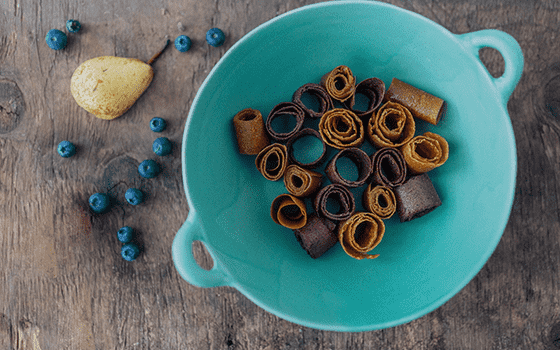Audrey Sckoropad
Getting out to see the brilliant fall colours is always a good reason to go for a hike. In Quebec, we’re lucky to have such beautiful parks and mountains nearby where we can go exploring for the day.
Nature hikes are even more enjoyable when you have a backpack full of drinks keep you hydrated and snacks to munch on while admiring the views.
To help you prepare for your next outdoor adventure, here are a few tips and nutritious recipes made with local ingredients.
1. Beverages
With any physical activity, hiking included, it is extremely important to stay hydrated. Of course, a bottle of water is always a must, but for a little extra boost mid-way, I like to bring fresh juice made from locally-grown Concord grapes and apples. Not only do these deep blue Quebec grapes taste delicious, they are a good source of manganese and vitamin C, and contain powerful antioxidants called polyphenols, which give them their colour as well as their health benefits.
Their juice has a sweet and slightly tangy taste. So, if you plan hike for an hour or two, take along a 1 litre of water and about 300 mL of fresh juice.
To make the juice:
- 1 L (4 cups) organic Concord grapes, with or without stems attached, washed
- 3 organic McIntosh apples
Put all the fruit in a centrifugal or a masticating (slow) juicer. Discard the pulp and store juice in an airtight container for up to 5 days in the fridge.
2. Dried fruit roll-ups
Fresh fruit is wonderful to eat, but it can be heavy to carry on hikes, and a banana in a backpack always ends up bruised. My solution: fruit leather made with a dehydrator. Dehydrating fruit and vegetables lets them retain their beneficial properties because it doesn’t subject them to high temperatures. The food simply undergoes a drying process. I started experimenting with fruit leather recipes when I found myself with too much overripe fruit. Fruit leather is easy to carry and really delicious.
To make fruit roll-ups
Choose ripe produce that can be puréed and pairs well (for example, strawberries and rhubarb, or pears and apples). Wash fruit and remove the bruised parts, stems and cores; you can also peel it, if you like (but remember skin can be very nutritious, especially when it’s organic.) Make a purée using a blender. Two apples and two pears are a good ratio.
Pour 375–500 mL (1 ½–2 cups) purée onto the dehydrator sheets or plastic mesh over the trays. Because the outer edges tend to dry faster, the purée should be ⅛” thick in the centre and ¼” thick around the edges. Set the temperature to 58 °C (135 °F). The fruit will take about 4 to 6 hours to be fully dehydrated. The dried strips should be slightly shiny and not sticky. Let cool and remove from tray. Roll the leather to make tight cylinders. Wrap in plastic and store in an airtight container.
3. Fall veggie vegan nuggets
I don’t know about you, but when I go hiking in the mountains, I love to have a lunch packed for when I reach the summit. This well-deserved meal always tastes extra delicious after a good climb in the fresh air. One of my favourite recipes for this kind of picnic is for vegan nuggets. They can be made with a variety of vegetables. Here’s a recipe that makes good use of the abundance of fall vegetables available:
Ingredients:
- 500 mL (2 cups) cooked butternut squash, mashed or puréed
- 15 mL (1 tbsp.) flaxseed
- 45 mL (3 tbsp.) coconut flour
- 125 mL (½ cup) kale, finely chopped
- 1 clove garlic
- A drizzle of coconut oil
- 60 mL (¼ cup) oat milk
- 2 mL (½ tsp.) cinnamon
- Salt and pepper, to taste
- Preheat oven to 190 °C (375 °F)
- In a skillet, sauté kale and garlic in a bit of oil.
- Combine remaining ingredients in a large bowl and add cooked kale.
- Make small oval nuggets (30 mL/2 tbsp.) and arrange on a parchment-lined baking sheet.
- Bake for 25 minutes.
- Let cool. Refrigerate or take them with you on a hike! They can be eaten plain or with a bit of vegenaise or hummus!
Have a great gourmet hike!

